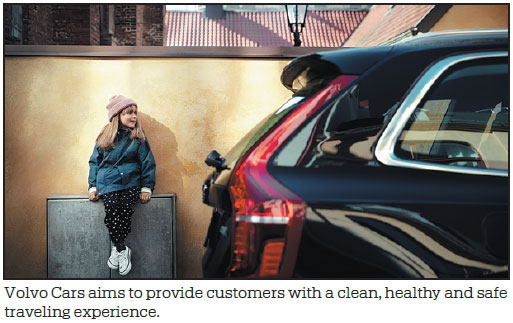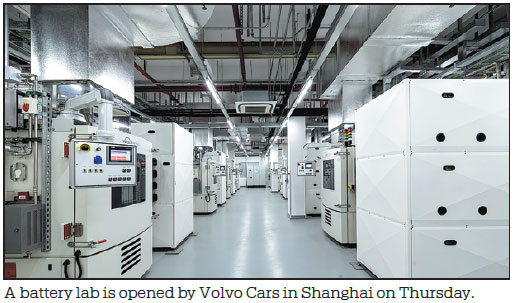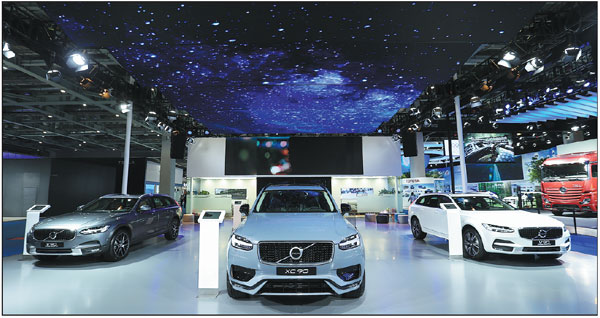Volvo pledges greater electrification for future
Luxury car manufacturer Volvo Cars delivered its forward-looking development concepts of safety, health and sustainability while showcasing three imported models at the second China International Import Expo, held in Shanghai from Tuesday to Sunday.
"Volvo Cars has achieved rapid development in past few years, growing from a Swedish car brand to a truly global enterprise," said Yuan Xiaolin, senior vice-president of Volvo Car Group and president and CEO of Volvo Car Asia Pacific.
This is the second year that Volvo Cars has participated in the CIIE.
"We will continue to work to promote free trade in an open market. We believe that openness and cooperation will bring more opportunities to the development of Volvo Cars," Yuan said.
|
Volvo Cars showcases three imported models at the second China International Import Expo. Photos Provided to China Daily |
The all-new V60, the new XC90 SUV and the V90 Cross Country were showcased at the CIIE.
The three models are all equipped with Advanced Air Cleaner, an innovation co-developed by Volvo Cars and Swedish air purifier manufacturer Blueair. This system can filter up to 95 percent of fine particles with a diameter of 2.5 micrometers or less.
Together with Volvo Cars' energy-saving and environment-friendly power systems, such as City Safety and Pilot Assist, the cars aim to provide customers with a clean, healthy and safe traveling experience.
As a company with Swedish roots, Volvo Cars also had a presence at the Sweden Pavilion at the expo. There, the carmaker exhibited its latest innovations and mobility solutions.
On Thursday, Volvo Cars opened its first battery lab in the Asia Pacific region. Located in Shanghai, the battery lab will focus on the development and testing of batteries for both plug-in hybrid electric and pure electric vehicles.
The battery lab will test batteries based on global and local standards to ensure the safety of electrified vehicles. As China is the world's largest new energy vehicle market, the lab will also address the demands of the Chinese market, Yuan said.
The opening of the battery lab is a concrete step in Volvo Cars' commitment to electrification and suitability, the carmaker said.
Since being acquired by Chinese automaker Geely in 2010, Volvo Cars has thrived and entered a stage of full-scale growth with establishment of new branches to boost its production, R&D, procurement and sales.
With Europe, Asia Pacific and the Americas at the core of its global layout, Volvo Cars has the capability to rapidly respond to changes in the global market and in consumer demands.
Over the past 10 months of 2019, Volvo Cars sold 568,663 vehicles worldwide, an increase of 8.1 percent compared to the same period last year. The increase in sales came largely thanks to the company's globalization strategy and forward-looking approach.
In 2017, Volvo Cars announced that every vehicle launched from 2019 forward will have an electric motor, making the automaker one of the first companies to launch such a bold electrification strategy.
To provide a solid foundation for its electrification efforts, Volvo Cars in May partnered with battery manufacturers CATL and LG Chem to provide lithium-ion batteries. The slew of batteries, valued at billions of dollars, will be launched over the coming decade for next-generation Volvo and Polestar models.
The company also announced its 2040 climate plan in Los Angeles in mid October, pledging to be climate-neutral by 2040. To get there, Volvo Cars will dramatically reduce the life cycle carbon footprint of its products.
On the same day, Volvo Cars unveiled its first pure electric SUV, the XC40 Recharge, which is expected to hit the market next year. The model will be the first model equipped with a brand new infotainment system powered by Android with Google technologies built-in.
Volvo Cars said the company would like to partner with forward-looking enterprises with common interests and goals to help them to stay ahead in the autonomous driving and intelligent vehicles sectors.
The carmaker has cooperated with global companies, including Google, Huawei, iFlytek and Alibaba, to build an open intelligent service ecosystem.
In addition, Volvo Cars and Uber unveiled a jointly developed production car capable of driving by itself. Volvo Cars plans to use a similar autonomous base vehicle concept for the introduction of its future autonomous driving cars in the early 2020s.
Its current partners in the autonomous driving filed include Uber, Baidu, Zenuity and Luminar.
China plays an important role in Volvo Cars' global development. The carmaker has three vehicle manufacturing plants in Chengdu, Daqing and Luqiao district in Taizhou in China to supply local markets and world markets in Europe and the United States alike. In addition, there is one engine manufacturing plant in Zhangjiakou in China.
Volvo Cars inaugurated its Asia Pacific headquarters in Shanghai earlier this year and set up a design center and a R&D center. The carmaker also launched its first brand experience center in China in June, situated in Chengdu.
China has become an engine for the development of Volvo Cars in the Asia Pacific region and even the world, the carmaker said. The country is also a strategic core of Volvo Cars' global layout and a hub for exporting China-made Volvo cars. About 40 percent of Volvo Cars vehicles produced in China are exported to more than 70 countries and regions worldwide, according to the carmaker.
Over the past 10 months of 2019, Volvo Cars sold 123,551 vehicles in China, up 15.2 percent compared with the same period last year, despite a decline in China's auto market during the past year.


(China Daily 11/11/2019 page19)















